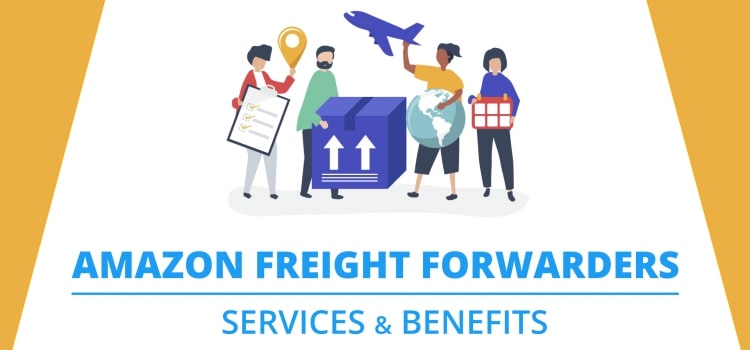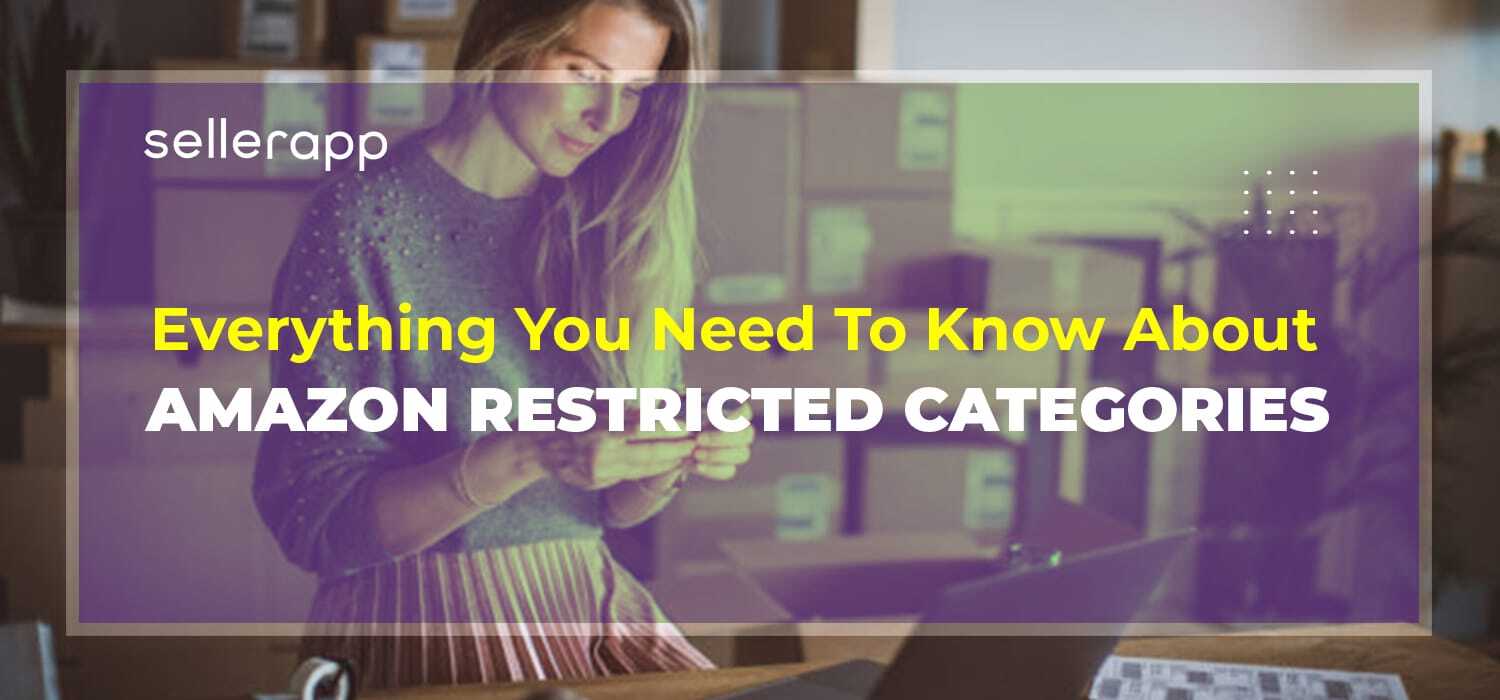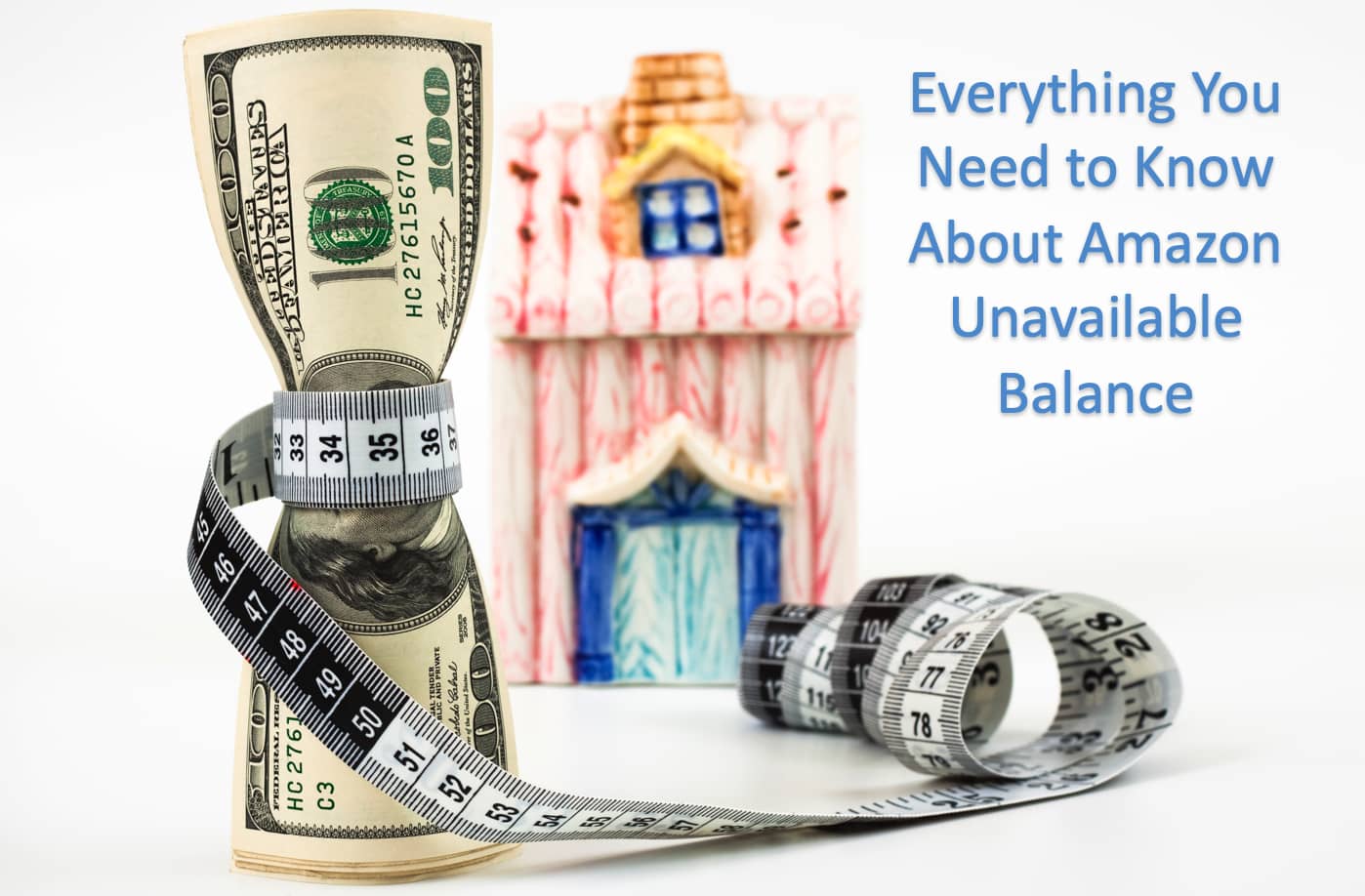A Definitive Guide On Amazon Freight Forwarders [FBA]

If you have been selling at the online marketplace, then chances are that you might have come across the term – Amazon freight forwarders.
Importing & exporting are vital elements for any lucrative business. Though international shipping presents bigger business opportunities, it is also daunting at the same time.
The paperwork, regulations, and huge processes involved in global trade might seem intimidating.
Shipping abroad Calls for two things – complexity & excess work.
Yes, you can expand internally, but this needs bigger investments in logistics, finding the right skill set(s), and technology licenses to ensure that everything runs smoothly.
The investment to build or expand a logistics team for a company is undesirable, and the cost can turn out to be very high.
But you can still be a fruitful international shipper without being stuck with logistics. That’s where a freight forwarder comes in handy.
Before we get into detail about it, let’s begin this blog with a quick introduction about freight forwarding and when & why do you need one.

Quick Guide:
- What Is A Freight Forwarder?
- What Does A Freight Forwarder Do?
- What Do Freight Forwarders Offer?
- Why Should You Use A Freight Forwarder?
- Benefits Of A Freight Forwarder
- How Do Freight Forwarders Charge For Their Services?
- How To Choose A Freight Forwarder?
- What Are The Key Phases Of Freight Forwarding?
- What Documents Should A Freight Forwarder Provide?
- About Amazon Freight Forwarders & Hand Carry
- About Customs, Duties, and Taxes
- Final Thoughts
What Is A Freight Forwarder?
A freight forwarder, forwarding agent, or a forwarder, also known as NVOCC (Non-Vessel Operating Common Carrier), is a company or a person that helps in organizing shipments for corporations or individuals to get goods from the manufacturers or producers to a final distribution point (can be a customer’s destination or a market).
So, freight forwarders are usually firms that specialize in organizing storage & shipping for merchandisers on behalf of their shippers. They provide a wide range of services like:
- Preparation of shipping & export documents
- Tracking inland transportation
- Booking cargo spaces
- Warehousing
- Freight consolidation
- Negotiating the freight charges
- Cargo insurance
- Filing the insurance claims
A freight forwarder usually ships under its lading bills or air waybills (also known as house lading bills or house airwaybills). The associates or agents at the destination provide reconsolidation, freight collection, and document delivery services.
In simple words, a freight forwarder is a firm or a company, which organizes your importing & exporting of goods.
Using a good freight forwarder for importing and exporting your goods can make the entire process less stressful.
What Does A Freight Forwarder Do?
A freight forwarder serves as an intermediate between the shipper and the distribution point. While a freight forwarder doesn’t move the freight itself, they help in arranging or organizing different transportation services like:
- Road transport
- Ocean shipping for cargo ships
- Expedited shipping via air freight
Freight forwarders have established relationships with different carriers, from trucking companies, ocean liners to air freighters, for negotiating the best price to move the shippers’ goods via trade routes.
They work around several bids and choose the ideal path, which optimizes cost, reliability, and speed.
They usually handle plenty of logistics to ship goods from one intercontinental destination to the other.
To adhere to the shipping requirements and export documentation, many exporters use freight forwarders to serve as their shipping agents. The forwarders advise and assist customers on how to ship their goods efficiently from one destination to the other.
The broad knowledge of the forwarders on regulations, documentation requirements, banking practices, and transportation costs helps ease the process of exporting for many companies.
In this SellerSPEAK video, Tim reveals why hiring reliable freight forwarders are crucial for consistent shipments. WATCH:
What Do Freight Forwarders Offer?
Freight forwarders play a key role in freight transportation. They advise customers about the important aspects of the supply chain.
The key services that freight forwarders provide are:
- Tracking the transportation
- Ensuring that the cargo picks up and drops on the scheduled time
- Negotiating the freight charges
- Getting the shipping & exports documents ready
- Booking the warehouse
- Carrying out the cargo insurance
- Collecting the freights
They also take care of:
- Custom clearance
- Custom documentation
- Custom insurance
Further, they help with the carrier documentation, lading bills, warehousing, and payment modes.
Why Should You Use A Freight Forwarder?
One of the best things about a freight forwarding service is that they can save your time and energy by offering reliable transportation of your goods for reasonable rates.
Any company that deals in international transportation consider a freight forwarder as an important asset. Its services are particularly useful when your in-house resources aren’t well-versed in international shipping processes.
Luckily, an international freight forwarder helps in maximizing your e-commerce business, predominantly by providing a logistics department for your supply chain. Besides helping you to save time and money, they are also the best investment.
Benefits Of A Freight Forwarder
Dealing with the transport carriers directly is great when for in-city or in-state deliveries. But the case isn’t the same when you are dealing with international trading & transport.
Hence, picking a firm that gives different freight-forwarding services can be a big advantage. A freight forwarder offers paperwork, advice, and the guidance required to get your shipments delivered to the destination.
Let’s see what the other benefits of using freight forwarders are:
1. Cost-effective
One of the best benefits of using freight forwarders is that they give competitive costs depending on the services a business needs.
They can even lower the prices by making special arrangements with other companies, which need goods to be sent through the same transport service and to the same terminus.
The freight forwarders do this by evaluating the company’s goods and further, consolidating them with the shipments of other businesses to develop transport ideas that can handle both in a single load. This strategy also cuts down the freight charges.
In addition, cargo transportation rates tend to change, mostly on an everyday basis, and this is especially the case when you are dealing with ocean transport. Unlike carriers that tie you up with a contract, a freight forwarder offers real-time rates for your shipments.
2. Good knowledge about the customs
Freight forwarders have a good amount of expertise and knowledge on importing and exporting goods via customs services.
They have the most updated information about the customs rules of several other countries, helping you take care of all the obligatory paperwork, tariff payments, and handling other taxes.
When all these are taken care of, it prevents a business’s goods from being stuck in the dock. So, there are no more struggles in filing unfamiliar paperwork.
3. Better control
Freight forwarders usually specialize in any one service area, either market or transportation mode. This enables a business to select how many services should a freight forwarder handle, giving them more control over how shipments can be handled.
By knowing the company’s product type, the freight forwarders will have clear knowledge with whom the transport can be booked, what the suitable routes can be, and which shipping service can do its best job forward.
This ensures that the company’s goods reach their destination at the allotted time in the same condition when they initially left the warehouse.
4. Offers special services
One of the best advantages of a freight forwarder is that it can offer trade-related services to a company.
Such services are designed to handle all the:
- Documentation needed for shipments,
- Bill of lading
- Bank papers for releasing the payment
Also, a freight forwarder can offer insurance services for all the shipped products.

How Do Freight Forwarders Charge For Their Services?
When it comes to freight forwarder charges, there are multiple factors to look into. Since various elements go into shipping, calculating the actual cost of any freight forwarding service is not straightforward.
You will also come across a few freight forwarders that include certain charges in their upfront quotation whereas others give them as optional add-ons. In certain cases, a freight forwarder may not give a specific service at all, leaving those arrangements to be done at your cost.
Hence, it is vital to get a complete breakdown of what is included in the quote before engaging with the freight forwarder’s service.
Keep in mind that a renowned freight forwarder won’t have any issue in providing you with a detailed breakup. This will also help you to make comparisons with other quotes.
Here is a breakdown of various shipping elements that are to be paid. Now, whether they are included in a particular quote or not is something you should confirm with the forwarder you choose.
1. Carrier Cost
Whether you want to have your freights shipped by sea, road, or air, the transportation mode has to be paid for. Generally, sea freights are the cheapest whereas air freights are the costliest.
You might think that the total distance traveled affects the cost – though it may not be the case. A bigger distance doesn’t need to equal a bigger expense.
Moreover, freight forwarders can always negotiate for low carrier charges on popular routes.
2. Container Cost
While shipping through the sea, you will be charged in one of these two ways:
- FCL – Full Container Load
- LCL – Less than Container Load
Going with LCL might be cheaper, especially when you do not have many goods to occupy a container, which means that you will be sharing the container with other companies’ shipments.
In this case, there will be a cost involved while separating the shipments at the destination point. Likewise, with air freights, your shipments will be packed into ULD (Unit Load Device), which can either be in the form of a container or a pallet.
Also Read: What Is LTL Shipping?
3. Cargo Type
Certain cargo types cost higher to ship when compared to others. Now, this might be because they need a one-of-a-kind container to ship those goods. It could be because they are perishable items, dangerous goods, or things that require careful handling.
Goods that do not fit into standard containers or that require any specialist equipment (like a crane) to load and unload will be costly to ship.
4. Cargo Volume & Weight
The cargo’s weight and size can together impact the overall shipping cost. A shipment’s chargeable weight is estimated by converting the total volume into weight equivalent.
So, the chargeable weight will be the greater one, it could be either:
- The computed volumetric weight, or
- The actual weight
There might be times when two shipments can have the same weight. In such cases, the one that occupies excess space costs higher to ship.
5. Packaging & Palletization
While importing & exporting, the goods need to be palletized as well as packed in a particular way for safety. Also, the wood used for Product packaging is subject to international legislation.
Remember that a few freight forwarders charge additionally for packaging. This is because the shipments need to be packed with special things. This also ensures that your goods adhere to the government rules applicable at the terminus. Oh, you don’t want your goods to be returned to the origin port for re-packing, as this can be too costly!
6. Insurance
Leaving your goods uninsured can be vulnerable. Therefore, it is important to protect your shipments with cargo insurance. This facility is something that most freight forwarders will offer as an add-on service.
Before you opt for the service, ask the forwarder if the insurance is incorporated in the quotation or it is available only as an add-on.
However, if the forwarder does not offer cargo insurance, you will have to buy it from a broker or an insurer directly.
7. Documentation Cost
Freight forwarders will typically complete the necessary documentation, like import & export paperwork, Bill of Lading, and invoice for you with ease.
However, an admin cost for this service will usually be included in the upfront estimate. Goods that need special paperwork, like restricted or dangerous items, will incur an extra charge.
8. Destination Cost
When it comes to destination costs, there are multiple aspects involved in the process. This includes:
- Terminal handling charges
- Charges to clear the goods from the loading & discharge ports
In addition, a port might also levy an extra security surcharge. Besides these, other possible destination costs comprise:
- Warehousing fees
- Unpacking (the cost to split the LCL shipments)
- Inland haulage cost (if required)
9. Administration Cost
Undeniably, using the freight forwarder services will save you time and the hassles involved in coordinating, organizing, and managing various elements of the shipping process. However, the forwarder does not execute this job for free. There will be an administration fee, which will be a part of the quote. And this is something you must pay attention to.
10. Additional Surcharges
A carrier can apply a fuel surcharge to protect themselves from variations in the fuel costs – which is also known as BAF (Bunker Adjustment Factor).
Besides BAF, it can also charge something called CAF (Currency Adjustment Factor) to guard them against:
- Currency fluctuations
- War risk surcharges
- Security surcharges
- Peak season surcharges
- Demurrage penalty (if there is a delay in loading/unloading)
11. Additional Services
A few freight forwarders provide extra services to handle the entire shipping process from one end to the other – from product sourcing, packaging to unpacking, organizing, warehousing, distributing, and delivering them to the right customers.
When you compare the quotes of different freight forwarders, it is vital to understand what exactly is included in the estimate so that you can know which quote offers the best value for money.

How To Choose A Freight Forwarder?
Since you are now aware of the basic process of freight forwarders, you will have better clarity on what to talk about while choosing the best amazon FBA freight forwarder for your business.
Research and list a few best freight forwarding services in a paper or an Excel sheet along with their contact details. Look at every company’s website carefully and see what they offer.
It is best to have a call with the service provider and look for the following:
1. Check For Delivery Destinations
Even though the company might advertise itself saying that it ships internationally, it doesn’t mean that that will cover all the countries.
A good forwarder will always include accurate information on the website about where they pick up & deliver to.
Apart from this, check if they offer an all-inclusive delivery service – door-to-door service than port-to-port.
If they offer port-to-port, you will be incurring extra costs while booking for road transportation to finalize the delivery.
2. Available Insurance Options
A forwarding company usually offers a standard insurance plan to cover two things:
- Basic loss
- Damage cost
Ask if there ate additional options available – especially if your shipments are time-sensitive or valuable.
Shipments involving solar panels, pricey machinery, antiques, glass, or fragile items must be packed professionally for safe export. A few items might be excluded from a freight forwarder’s liability insurance. Therefore, it is important to check.
3. Experience With Amazon FBA
Amazon is one of the largest retailers in the world, and they have precise requirements for the items to be packaged, labeled, and stored. Yes, you can do this on your own, it takes plenty of time and there are risks involved. You might end up doing big mistakes, causing rejections from the Amazon fulfillment center.
Once Amazon Fulfillment centers send your shipments back, it is going to cost you a lot.
Therefore, it is important to work with a forwarder who has good experience in handling Amazon shipments because they will know its requirements and further, work with the suppliers to meet the criteria.
4. Tracking System
Even though their support team should be available whenever you want to talk to them, it will be more convenient if you can track your packages yourself.
Ask the freight forwarder what type of tracking tool they use and check if it updates you in real-time or not.
A good tracking system provides the following:
- Exception notifications
- Purchase Order management
- Clear dashboards
- Customized reports
- Digital copies of paperwork
- Proofs of delivery – online & offline
5. Packaging Services
When you contact the freight forwarder, make sure to ask about their packaging services. Check if there are additional services for it, or it is included with the plan.
Most forwarding companies supply sealable bags (plastic) for small products and labels for bigger boxes.
What Are The Key Phases Of Freight Forwarding?
The process of freight forwarding is categorized into 6 key stages:
- Export haulage: This phase involves transferring the goods from source to the forwarder’s warehouse.
- Export customs clearance: This phase involves clearance in leaving its origin country.
- Origin handling: This phase involves unloading, examining, and validating the cargos against the booking documentation.
- Import customs clearance: This is the phase where authorities check for customs paperwork.
- Destination handling: This phase is where your cargo is handled after it reaches the destination office.
- Import haulage: This is the phase where your cargo is transferred from the warehouse to the final destination.
What Documents Should A Freight Forwarder Provide?
Freight forwarding involves lots of paperwork, particularly when you are shipping overseas. Make sure that your freight forwarder provides you with these important documents:
- Bill of Lading (BOL) contract
- Commercial invoice
- Certificate of the origin statement
- Export license
- Inspection certificate
- List of export packing
- Shipper’s export declaration document
Only when you have all the documents mentioned above, your goods will reach your customers without any delay or issue.
About Amazon Freight Forwarders & Hand Carry
If you use a hand-carrying or freight forwarding service, it is important to pay attention to Amazon’s terms & conditions, which include:
- Amazon will not be responsible for any defect, damage, loss, or material difference that occurs to your goods after they are delivered. This means that Amazon will not provide any refund or replacement for the goods delivered to a freight forwarder or you.
- The goods lost after you or your freight forwarder receives, will completely be your responsibility.
- The goods that arrive in a damaged condition can be refused at the time of delivery and further, instruct the freight forwarder to do the same.
- If you (or the freight forwarder you send to) has a U.S. address, buy goods from amazon.com in order to ship them to any U.S. location.
- You (or the freight forwarder) are considered the exporter. Therefore, you are accountable solely for compliance with the export & import rules of the destination country.
- Amazon shouldn’t be mentioned on any of the export documentation (example: invoices, export declarations, air waybills, packing lists, etc.).
- If you (or the freight forwarder) don’t have a U.S. address, you (or the freight forwarder) cannot export the items without Amazon’s written authorization.
About Customs, Duties, and Taxes
The recipient or the receiver is the importer and should comply with every law and rule in the destination country.
Orders that are shipped outside the U.S. are subject to:
- Customs duties
- Import taxes
- Fee levied by the respective country
The receiver of the international shipment might be subject to these charges, which will be levied after the consignment reaches the receiver’s country.
The recipient should fulfill any extra charge incurred during the customs clearance. Amazon will neither fulfill these charges nor it can predict what the charges may be.
The customs policies differ widely. Therefore, it is important to contact the local customs office for proper information on clearance procedures and the causes of the delay.
Final Thoughts:
- The customs offices of certain regions or countries require the importer’s record to give an identification form before they release the shipment.
- You might be asked to give your identification number like UIN (Unique Identification Number), Tax ID, or CPF for this purpose.
- Regions/countries that ask for identification number include Chile, Brazil, Ecuador, China, Israel, India, Qatar, Peru, South Korea, South Africa, Turkey, and Taiwan.
More blogs from the SellerApp
Import From China To Australia
How Amazon FBA Impacts Your Seller Reputation
Frequently Asked Questions – Amazon FBA Prep












Dewat
March 25, 2019Very good and helpful post
Melony
March 26, 2019Very useful information SellerApp
Gold
March 19, 2021If I’m starting out and my order is under $700, do you think it’s still important to get a freight forwarder or not?
Arishekar N
August 13, 2021For a small order like that, you shouldn’t need a freight forwarder.
Zenny
May 8, 2021Great Advice! Your article has all the necessary details.